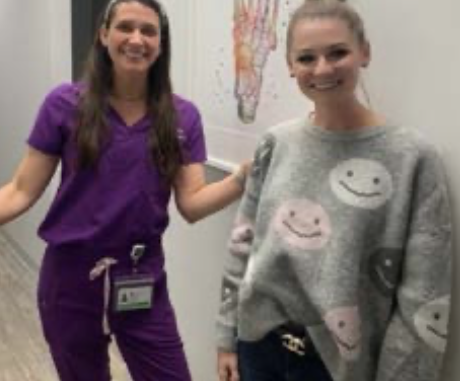
Layla M. Halterman (lahalterman@ursinus.edu)
Sarah Haller shined bright on the stage as a ballerina for fifteen years. Now, she is shining even brighter as a foot and ankle specialist on TLC’s “My Feet are Killing Me.”
Haller spent her childhood in South Carolina. She attended an all girls private school, Columbia College, and majored in biology. After scoring exceptionally well on the MCAT, she soon found herself dancing all the way to medical school in Miami to pursue podiatry. “I figured I could help ballerinas even if I couldn’t be one.”
A typical day for Haller begins at the crack of dawn as she jumps on her Peloton bike for a quick self-care sweat. From there, she arrives at the office, sees patients from nine to twelve, and hops over to the hospital to operate until it’s time to head home. Most Fridays are dedicated to educating resident medical students and conducting free surgeries to those in need. “Along the way, I had to learn. Someone took the time to teach me, so I want to do the same for others. It’s my way of giving back to the community.”
Her longtime friend and now TV colleague, Dr. Brad Schaeffer, asked her to help him with surgery on Season 1 of “My Feet are Killing Me.” Soon after, TLC producers approached Haller with the idea of having a third doctor join the hit medical reality show and luckily for us viewers, she agreed. Haller films on weekends which can sometimes be twelve to fourteen hour days. “It’s fun though. Anything can happen on TV,” she joked.
Haller loves what she does. “I love people. I love hearing their stories. I love that I can find a solution for them. It’s the greatest feeling ever to know you can give someone hope and make their life better,” she said adamantly.
She is no stranger to challenges either, and has solved some of the most unique and complex foot cases in America. By far, the most difficult one was a patient who had a severe infection and waited too long. “I went in and removed some of that bacteria but I ended up losing their foot or leg anyway. That’s the worst feeling,” she explained. “But I’m still helping people, just not in the way I thought,” she added.
Haller advises those wanting to pursue medicine to take advantage of as much training as possible. “Go out there, start early, volunteer at your local blood drive, and learn how to interact with patients. That is the key to medicine.” Additionally, she wants students to know that it isn’t about money. “If you love what you do and you love the patients you see, that’s all that matters.”
In Haller’s eyes, life is all about perseverance. “You’re going to have bad days. You’re going to have setbacks. You’re not going to ace everything. Keep trying. Tomorrow is a new day.”
She has shattered ceilings, on and off television, especially being a first generation college graduate, but wants to be most remembered for her kindness, optimism, and outstanding bedside care. “Patients become a part of who you are. It’s not just a bunion or an ankle fracture. There’s a person attached to that,” she concluded.
